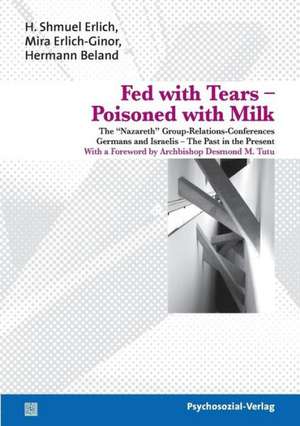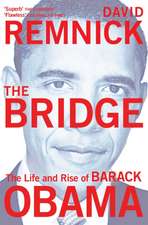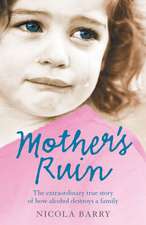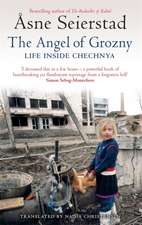Fed with Tears - Poisoned with Milk
Editat de H. Shmuel Erlich, Mira Erlich-Ginor, Hermann Belanden Limba Engleză Paperback – 31 dec 2008
Preț: 265.42 lei
Nou
Puncte Express: 398
Preț estimativ în valută:
50.80€ • 55.20$ • 42.70£
50.80€ • 55.20$ • 42.70£
Carte disponibilă
Livrare economică 31 martie-14 aprilie
Preluare comenzi: 021 569.72.76
Specificații
ISBN-13: 9783898067515
ISBN-10: 3898067513
Pagini: 194
Dimensiuni: 148 x 210 x 13 mm
Greutate: 0.26 kg
Editura: Psychosozial Verlag
ISBN-10: 3898067513
Pagini: 194
Dimensiuni: 148 x 210 x 13 mm
Greutate: 0.26 kg
Editura: Psychosozial Verlag
Notă biografică
Mira Erlich-Ginor was born 1944 in Israel. She is Training and Supervising Analyst, Israel Psychoanalytic Society and Institute, held leadership positions including Co-Directing Three Year Psychotherapy Program, Chair, Admissions Committee, is founding member and past Chair of OFEK - The Israel Association for the Study of Group and Organizational Processes. Her organizational and consultancy career includes extensive work in Group Relations Conferences in Israel and internationally. She is Faculty member of the »Program in Organizational Consultation and Development - A Systems Psychoanalytic Perspective«, cosponsored by OFEK and the Sigmund Freud Center at the Hebrew University.H. Shmuel Erlich, Ph.D., was born 1937 in Germany, immigrated to Palestine 1939. He was Training and Supervising Analyst, Israel Psychoanalytic Society and Institute, held leadership positions, including that of President, in the Israel Psychoanalytic Society, and clinical leadership positions, including Chief Psychologist and Director of Adolescent Service, Eitanim Psychiatric Hospital and Director of Training, Summit Institute.Hermann Beland was born in Germany 1933. He studied Protestant Theology, is Training and Supervising Analyst at the Berlin Psychoanalytic Institute, former President of the German Psychoanalytic Association (DPV), has many publications on psychoanalytic theory and technique, as well as on Anti-Semitism and other unconscious dynamics of Western society.Rafael Moses, M.D., was born 1924 in Germany, and died 2002 in Jerusalem. He immigrated to Palestine in 1937. He was Training and Supervising Analyst, Israel Psychoanalytic Society and Institute, held leadership positions in the Israel Psychoanalytic Society, including that of President, and in the International Psychoanalytic Association. He was a founding member of OFEK - The Israel Association for the Study of Group and Organizational Processes. He held academic and psychiatric leadership positions, including Professor and Chairman, Dept of Behavioral Sciences, Ben-Gurion University of the Negev, Medical Director of Ezrat Nashim Psychiatric Hospital and of Summit Institute; Sigmund Freud Professor of Psychoanalysis and Director of Sigmund Freud Center for Psychoanalytic Study and Research at the Hebrew University of Jerusalem (1987-1988), and Erikson Scholar at the Austen Riggs Center, Stockbridge, Massachusetts (1988-1989).
Recenzii
Mira Erlich-Ginor was born 1944 in Israel. She is Training and Supervising Analyst, Israel Psychoanalytic Society and Institute, held leadership positions including Co-Directing Three Year Psychotherapy Program, Chair, Admissions Committee, is founding member and past Chair of OFEK - The Israel Association for the Study of Group and Organizational Processes. Her organizational and consultancy career includes extensive work in Group Relations Conferences in Israel and internationally. She is Faculty member of the »Program in Organizational Consultation and Development - A Systems Psychoanalytic Perspective«, cosponsored by OFEK and the Sigmund Freud Center at the Hebrew University.H. Shmuel Erlich, Ph.D., was born 1937 in Germany, immigrated to Palestine 1939. He was Training and Supervising Analyst, Israel Psychoanalytic Society and Institute, held leadership positions, including that of President, in the Israel Psychoanalytic Society, and clinical leadership positions, including Chief Psychologist and Director of Adolescent Service, Eitanim Psychiatric Hospital and Director of Training, Summit Institute.Hermann Beland was born in Germany 1933. He studied Protestant Theology, is Training and Supervising Analyst at the Berlin Psychoanalytic Institute, former President of the German Psychoanalytic Association (DPV), has many publications on psychoanalytic theory and technique, as well as on Anti-Semitism and other unconscious dynamics of Western society.Rafael Moses, M.D., was born 1924 in Germany, and died 2002 in Jerusalem. He immigrated to Palestine in 1937. He was Training and Supervising Analyst, Israel Psychoanalytic Society and Institute, held leadership positions in the Israel Psychoanalytic Society, including that of President, and in the International Psychoanalytic Association. He was a founding member of OFEK - The Israel Association for the Study of Group and Organizational Processes. He held academic and psychiatric leadership positions, including Professor and Chairman, Dept of Behavioral Sciences, Ben-Gurion University of the Negev, Medical Director of Ezrat Nashim Psychiatric Hospital and of Summit Institute; Sigmund Freud Professor of Psychoanalysis and Director of Sigmund Freud Center for Psychoanalytic Study and Research at the Hebrew University of Jerusalem (1987-1988), and Erikson Scholar at the Austen Riggs Center, Stockbridge, Massachusetts (1988-1989).
Cuprins
ContentsForewordDesmond M. Tutu, Archbishop Emeritus, Anglican Church of Southern AfricaI IntroductionH. Shmuel ErlichII The Story and History of the ProjectII.1 Israel Psychoanalytic Society and the Sigmund Freud CenterH. Shmuel ErlichII.2 The Stages of the German Psychoanalysts on Their Way to the First Nazareth ConferenceHermann BelandII.3 Events and Experiences Leading to the Idea of a German-Israeli Conference H. Shmuel ErlichIII Structure and DesignIII.1 The Process of Conference DesignEric MillerIII.2 Supplementary Comments on Design and StructureH. Shmuel ErlichIV The Conference ExperienceMira Erlich-GinorIV.1 Introduction: The Book and the Collage - A Concept and its ProblemsIV.2 Participants - Present and MissingIV.3 The Conferences ExperienceIV.4 Looking at the Invisible: The Unthought Known and the UnspeakableIV.5 The Danger/Fear of False ReconciliationIV.6 By way of Outcome - Getting out from the Imprisonment of the PastIV.7 To be staff in these Conferences IV.8 No Way and no Reason to Sum UpIV.9 List of ContributorsV Central and Emergent ThemesH. Shmuel ErlichV.1 Holocaust-Related Identity Components of Germans and IsraelisV.2 Special Trauma and Special RelationshipsV.3 Change and Transformation - the Burden of BetrayalVI Post Conference ExperienceH. Shmuel ErlichVI.1 Presentations, Discussions, Their Impact and ContributionsVII EpilogueH. Shmuel ErlichVII.1 Where to Now?VII.2 Who Needs These Conferences?References











